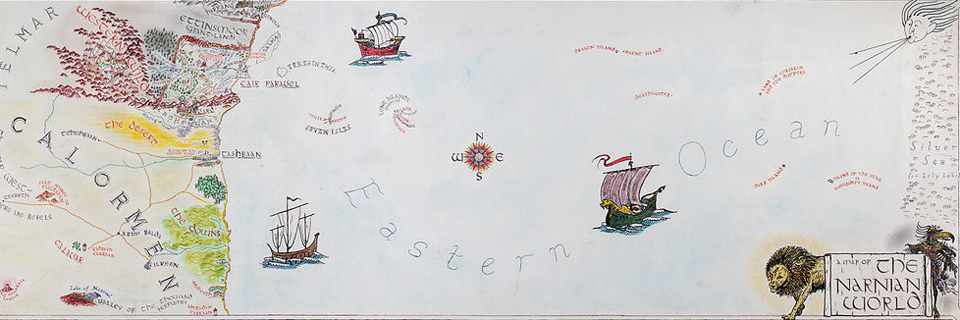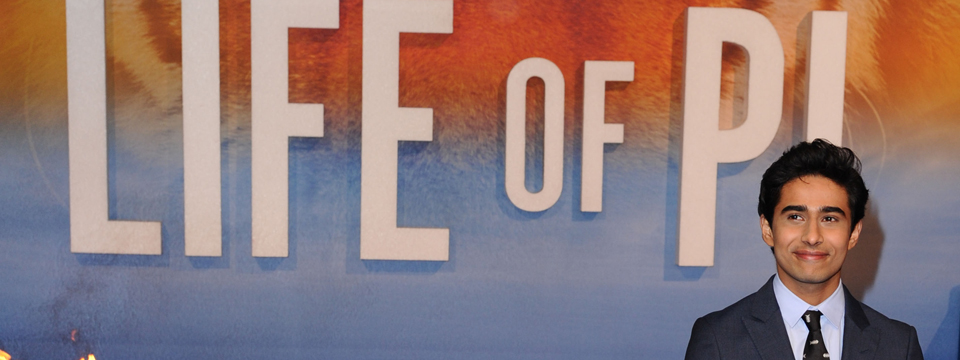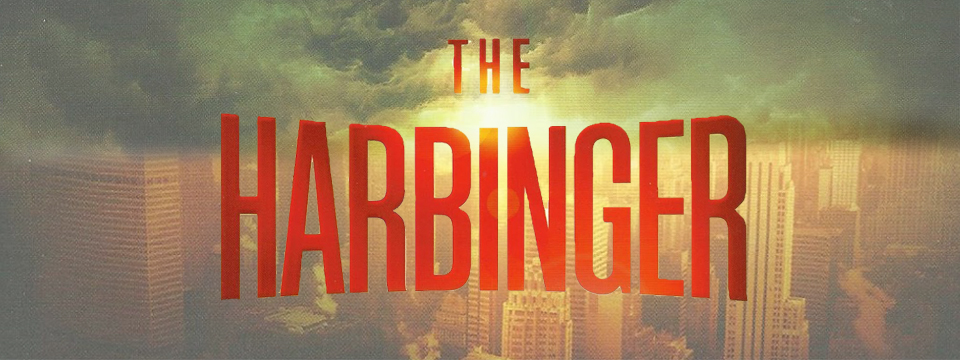
Al Mohler on the new Pope: How should Evangelicals respond?

Al Mohler
Dr. R. Albert Mohler, president of Southern Seminary, analyzes the papacy and offers thoughts on how Evangelicals should respond.
Listen to Dr. Mohler’s podcast here.
Attention Word Slingers readers: Beginning December 11, 2019, all posts will be available at BaptistMessenger.com. Thank you for reading Word Slingers!


Al Mohler
Dr. R. Albert Mohler, president of Southern Seminary, analyzes the papacy and offers thoughts on how Evangelicals should respond.
Listen to Dr. Mohler’s podcast here.

Every now and then I come across Christians who are either indifferent or opposed l to C.S. Lewis’ Chronicles of Narnia books series. The first group, I think, does not fully appreciate the quality and meaning of the books. The second typically dismisses them out of hand simply because the books deal with magic. It is to these groups I now wish to speak.
To the indifferent: Good stories matter
Stories matter to us as people. Stories, however, are especially important for children. Lewis understood this and, to his credit, sought to weave Christian ideals into one of the most beloved and memorable set of children’s novels in history.
Lewis said, “I thought I saw how stories of this kind could steal past a certain inhibition which had paralyzed much of my own religion in childhood. Why did one find it so hard to feel as one was told one ought to feel about God or about the sufferings of Christ? I thought the chief reason was that one was told one ought to. An obligation to feel can freeze feelings. And reverence itself did harm. The whole subject was associated with lowered voices; almost as if it were something medical. But supposing that by casting all these things into an imaginary world, stripping them of their stained-glass and Sunday School associations, one could make them for the first time appear in their real potency?”
As Professor Robert C. Newmon has said, “By transferring the Gospel story to another world, where humans are not the only rational beings, where animals can talk and the various figures of classical and northern mythology have real existence, Lewis allows us to see things from a different angle. Here God is the unseen emperor over the sea, and the lion Aslan is his son and the Christ-figure of Narnia. This transfer to another world also allows Lewis to use some of the figures and symbols of the Bible as hints for his readers, just as Jesus does in His parables. So Jesus, the Lion of the tribe of Judah, becomes the Lion of Narnia.”
The Narnia characters are memorable and fully developed. They face real dilemmas and help us understand the nature of good and evil. The Narnia stories do not in any way replace the biblical narrative. It simply predisposes children toward the biblical stories. Except for certain families who only delay the inevitable, children and young people eventually will be exposed to fiction stories. Kids are going to want to read and hear stories outside the Bible, so what kind will they pick?
The fairy tale is a popular genre and children, in general, are going to pursue one of the available options. Will they choose anti-Christian literature, like the Golden Compass? Or how about Harry Potter? These two newer series are wildly popular and are not amoral. The writers are not seeking to smuggle in Christian theology into the stories, like Lewis. Christian parents would do well to steer their children toward a class in the Narnia series. In choosing fiction, parents should pick ones that favor the biblical worldview, as does Lewis.
To the opposition: A distinction with a difference
The Bible very clearly prohibits the use of magic, especially divination (see Deut. 18 and Exodus 22). Why, then, would Christians be okay with the Narnia series, which has magic in it?
The key distinction is real magic versus make-believe magic. Lewis, in creating Narnia, has invented another realm that operates in a different temporal scheme. In other words, when Peter, Susan, Edmund and Lucy are transported from England to Narnia, the realities in which they operate change. The children (and adults) reading them are also whisked away to another time and place.
Yet even in Narnia, the biblical understanding of magic is underscored. Those who use magic for evil intent (the White Witch in The Lion, the Witch and the Wardrobe, and the Magician in The Magician’s Nephew) are the bad guys and looked down on for doing so. Even when the good guys (such as Lucy in The Voyage of the Dawn Treader) who dabble in magic to manipulate for their own gain, they are rebuked by Aslan.
In the opening scene of The Silver Chair, the boy Eustace wants to go back to Narnia where he had previously been. He wonders if they could use magic to get there. Notice the dialogue between him and Jill, who also wants to go there by using magic:
“You mean we might draw a circle on the ground – and write in queer letters in it – and stand inside it – and recite charms and spells?”
“Well,” said Eustace after he had thought hard for a bit. “I believe that was the sort of thing I was thinking of, though I never did it. But now that it comes to the point, I’ve an idea that all those circles and things are rather rot. I don’t think [Aslan] would like them. It would look as if we thought we could make him do things. But really, we can only ask him.”
Magic in Narnia not something to master like at Hogwarts School of Witchcraft and Wizardry. Quite the opposite. Magic is something to be feared and learn to make you more obedient to the Divine. Moreover, Lewis goes out of his way in book one of the Narnia series to explain that magical powers of Narnia are not available on earth.
While a committed fundamentalist never will fully embrace the Narnia series, he or she at least owes Lewis fans the dignity of not lumping his works in with secular fantasy literature.
In summary, C.S. Lewis’ Chronicles of Narnia are the best available writings of that genre and have helped millions of Christians (including the writer of this post) to better understand the grace and power and salvation offered only by Christ. May the series continue its popularity for many centuries to come.

There are plenty of popular fantasy novels written for children out there. Whether Harry Potter or the more insidious Golden Compass, I have found that none can come close to the warmth, wisdom and status of a timeless classic as C.S. Lewis’ The Chronicles of Narnia. Even The Hobbit, which is one of my favorites and is a superbly written classic, cannot quite attain the same level.
I must admit up front that I am biased, because God used Narnia to bring me to repentance and acceptance of Christ in my childhood. But I find there are many biased for this reason, and that is the series’ first and best quality. While other fantasy novels entertain and inspire, The Chronicles of Narnia points the way to Christ and eternal life.
The series has sold more than 100 million copies and has been adapted into major motion pictures. A brief overview from the Internet goes as follows: “Set in the fictional realm of Narnia, a fantasy world of magic, mythical beasts, and talking animals, the series narrates the adventures of various children who play central roles in the unfolding history of that world. Except in The Horse and His Boy, the protagonists are all children from the real world, magically transported to Narnia, where they are called upon by the lion Aslan to protect Narnia from evil and restore the throne to its rightful line. The books span the entire history of Narnia, from its creation in The Magician’s Nephew to its eventual destruction in The Last Battle.”
Unlike many writers today, Lewis did not select the most popular genre of the day and use a consultant’s business model to produce a series and milk it for all the money it’s worth. If he had, Lewis most certainly would not have chosen the children’s genre for his great ideas and themes.
Lewis says, “You and I who still enjoy fairy tales have less reason to wish actual childhood back. We have kept its pleasures and added some grown-up ones as well.” Each of the Narnia books is a pleasure to read and perfect for the whole family.
My young children enjoy it when I read them aloud. My oldest, now nine, has read parts of the series, which include all the great fictional characters a child could want—fauns, witches, centaurs, and even Santa Clause. Amid the plotline, Lewis cleverly “smuggles in theology,” as he says, so that the young are predisposed toward Truth and Christ.
The most beloved in the series is its second book, The Lion, the Witch and the Wardrobe. In the future, I plan to begin by reviewing it, then all seven of Lewis’ children’s novels in the Narnia series. Better still, the “Word Slingers” site would accept reviews from you on Narnia. To that end, we extend the invitation to all you “Narnian” writers out there. Contact us at communications@bgco.org if you are interested in composing a review.
“For Aslan! For Narnia!”

What if Castaway met We Bought a Zoo, which met New Age religion, which met National Geographic of animals, which all then met the movie Joe Versus the Volcano? That essentially what you have in the new movie, Life of Pi.
Based on the best-selling book by Yann Martel (published in 2001), which was part of Oprah’s recommended book, the movie is gaining popular and critical acclaim.
To its credit, Life of Pi is a story that immediately takes you in. At risk of spoiling the plot, we meet a young Indian boy (“Pi”) whose family owns a zoo. Due to bad circumstances, they must move to North American and en route their boat sinks.
The rest of the movie we sees Pi’s struggle to survive, which includes some stunning cinematic images of animals and nature. There is a plot twist at the end too that would make M. Night Shyamalan proud.
Be that as it may, the movie is just plain gross in places. Its PG rating is too low (should have been PG-13), and the way it treats religion is plain dangerous.
The storyline essentially tries to put Jesus Christ on a shelf with millions of other gods, sadly not a rare phenomenon in the Eastern, New Age world. As other movie reviewers have pointed out, the movie is syncretism on the silver screen. Jesus, however, is not A way to God, He is THE way (John 14).
Young adults and especially children would have too much difficulty not being riveted by the storyline and movie, so the movie is subversive. In spite of some good qualities, Life of Pi is not a movie I can safely recommend.

OK, I’ll admit it. I am not a conspiracy theorist. When the theories arise, I tend to roll my eyes. Yet every so often a work comes along that demands attention from even we who are skeptical, and one such book claims to “hold the secret of America’s Future.”
I am talking about The Harbinger, a best-selling fiction book by Jonathan Cahn. Mr. Cahn, who leads the Jerusalem Center in Wayne, New Jersey, has become a recognized author virtually overnight. The book has been endorsed by popular radio/TV personality Glenn Beck, himself no stranger to controversy or conspiracy theories.
While the book is presented as fiction, it is clear from his website and teachingmaterials that the author thinks there is truth behind the plot. Just what is that plot of The Harbinger?
“Before its destruction as a nation, ancient Israel received nine harbingers, prophetic omens of warning. The same nine harbingers are now manifesting in America with immediate ramifications for end-time prophecy. “Hidden in an ancient biblical prophecy from Isaiah, the mysteries revealed in The Harbinger are so precise that they foretold recent American events down to the exact days. The revelations are so specific that even the most hardened skeptics will find it hard to dismiss or put down. It sounds like the plot of a Hollywood thriller with one exception… IT’S REAL.”
While it was an entertaining work, there are a number of significant problems that make this a book I cannot recommend.
“This-is-that”
We should always be cautious to sit at the feet of a teacher who has a Bible in one hand and a newspaper in another. Christians must be careful not to equate every contemporary event with a biblical prophecy because we run the risk of being wrong and therefore undermining the deep truths of the Bible and our own testimony. The Harbinger is bad about this and even directly links 9/11 to prophesies in the Book of Isaiah.
Connect the dots
The Harbinger makes several tenuous connections between contemporary events and events that occurred in biblical times. Without spoiling the entire plot, there is “a mysterious figure called ‘The Prophet’”who helps another man interpret the times viz a vis the Bible. The author links a tree at Ground Zero to a tree of ancient Israel to make a point about America’s economic future. In another instance, the disgraced politician Sen. John Edwards was said to have spoken a prophetic message at a campaign stop that has eschatological implications. At times, the parallels may be fun to think about, but we must not make as much out of them as the author leads us to do.
Whoa, cowboy!
In Scripture and modern times, titles have meaning. To call someone an apostle or prophetic is a huge deal. In The Harbinger, the mysterious figure is called “The Prophet” (capital “P”). We Christians believe the biblical canon is closed and that while God certainly can do what He wishes, he has given the Faith “once and for all, delivered to the Saints.” In the Person of Christ and the Word, we have all the revelation we will need. We are not awaiting another Isaiah or Jeremiah. The author should have been more careful than to put the mysterious figure (whose name we never find out) on such a level.
Not necessarily all bad
Allow me to say a few good things about this work. First, it gets readers to think about more serious topics than, say, the Super Bowl halftime show. Second, the author does a good job in one scene at underscoring our individual need for salvation and redemption, which comes only from God. Finally, Mr. Cahan does point up some major societal sins that we Americans have committed, and stresses that we may likely face judgment from God—or at least a downfall—for these sins of pride, lust, greed and envy.
Summary
If you read The Harbinger, it is critical to do so with discerning lenses on. If the runaway bestseller, The Shack, is a moving story full of theological problems, this book is an entertaining story full of eschatological and ecclesiological problems. Some people will be able to “eat the meat and spit out the bone” of this work, but in the end, it will likely make for a very small meal for your soul.